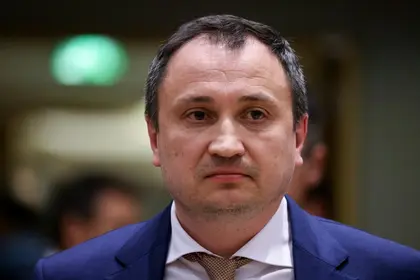The announcement of charges against Minister of Agrarian Policy and Food, Mykola Solskyi, by the National Anti-Corruption Bureau of Ukraine (NABU) for illegal land acquisition came as a surprise to many, including the presidential party’s press service, journalists, and deputies.
“Really? Right now? This is quite an unpleasant story,” one lawmaker remarked in comments to Kyiv Post.
JOIN US ON TELEGRAM
Follow our coverage of the war on the @Kyivpost_official.
In Ukraine, charges against a former official are unusual. But Solskyi’s case is very rare – he was handed a notice of suspicion of a criminal offense while in office.
The corruption scheme
Mykola Solskyi, a former lawmaker from the President’s Servant of the People party, and reportedly close to the former head of the Presidential Office, Andriy Bohdan, retained his career and position as chairman of the Verkhovna Rada Committee on Agrarian Policy after Bohdan’s departure.
During the full-scale war, he assumed the role of Minister of Agrarian Policy. However, the charges by the National Anti-Corruption Bureau date back earlier – between 2017 and 2019.
“Now, on behalf of the head of the SAPO [Specialized Anti-Corruption Prosecutor’s Office], the prosecutor reported suspicion of seizing land in the Sumy region with an area of about 2.5 thousand hectares worth Hr.291 million [$7.4 million] and an attempt to seize land with an area of about 3.3 thousand hectares for another Hr.190 million [$4.8 million] for the former chairman of the Agrarian Committee of the Verkhovna Rada – the current Minister,” SAPO stated.

Blinken Announces Another $2 Billion in Aid, Says Ukraine Can ‘Decide for Itself’ to Strike Inside Russia
According to law enforcement officers, the scheme unfolded as follows: First, a group that included Solskyi, representatives of the State GeoCadastre unit (the state service responsible for documenting land ownership boundaries), and some other local officials, destroyed documents that established state-owned enterprises’ rights to the land in perpetuity.
They then attempted to take advantage of a government program wherein every 18-year-old citizen of Ukraine is entitled to up to two hectares of land, provided they maintain/develop the land.
“Unused state land is taken, and then with the involvement of specific individuals in the state GeoCadastre, land plots are issued to about a thousand people, who are rewarded for participating,” the head of the agricultural company told Kyiv Post. “These people then lease or transfer these plots for long-term lease or emphyteusis [usage rights] to favored private enterprises.”
The source said that the problem arose when the criminal group, allegedly with Solskyi, mistakenly targeted land intended for the permanent use of some state enterprises.
“They destroyed documents about the ownership of this land by enterprises. At these enterprises, some either principled individuals or authorities noticed, and that's where the trouble started [for Solskyi],” the source told Kyiv Post.
For his part, Solskyi stated on the ministry's website that at the time, he was merely a lawyer, did not make significant decisions, and was prepared to cooperate with the investigation to uncover the truth.
Politics or coincidence?
Several high-profile resignations were anticipated this week. Numerous insiders from both the ruling party and the opposition had stated that they expected to see some government resignations.
However, on Monday evening, April 22, reports began to spread that government officials had abandoned plans to do a “reset.”
“Neither with the faction nor with the ministers, as far as I know, has anyone specifically discussed being dismissed or moved to another position,” a Kyiv Post source said.
So, Solskyi's case begs the question – was it politics?
According to a different Kyiv Post source, the land acquisition scheme was locally known in the Sumy region where it occurred in 2017-2018 – and discussions had long ago been held about its legality.
“Therefore, I do not doubt that the case was resumed politically to legitimize Solskyi's resignation,” the source asserted, indicating that if it had been a concern, it would have been dealt with long ago.
However, other sources that Kyiv Post spoke with did not view it as politically motivated.
“I think the NABU seized the moment when the documents were destroyed. That was the beginning of work on the case,” Yuri Nikolov, a Ukrainian investigative journalist, told Kyiv Post.
He said that discussions about government consolidation, merging several ministries to save money on officials’ salaries during wartime, and the resignation of ministers has been happening for several months.
“The idea of combining the Ministry of Agrarian Policy and the Ministry of Economy has been around for a long time. It was believed that this would reduce bureaucracy and improve coordination with the agricultural sector, which has been crucial during the war,” Vitaliy Kulyk, a political commentator and consultant, told Kyi Post.
Kyiv Post sources highlighted that this development came as a surprise even to the ruling Servant of the People party. At least, discussions about Solskyi's resignation were not known to have occurred.
The Servant of the People said that it was confident in NABU’s work.
“There are competent authorities. They need to understand,” its press service said. “We need to study the situation.”
People's deputies from the Servant of the People Party also confirmed that, as of midday April 23, the party leadership had not discussed Solskyi's situation.
Most of Kyiv Post's sources speculated that the timing of the charges brought against Solskyi was a coincidence – the National Anti-Corruption Bureau had simply completed its case and brought suspicion against the current minister.
What's next?
Kyiv Post's sources believe that the government is unlikely to retain a minister suspected of corruption – making his resignation quite likely.
However, a resignation would like happen only after a court ruling.
You can also highlight the text and press Ctrl + Enter






